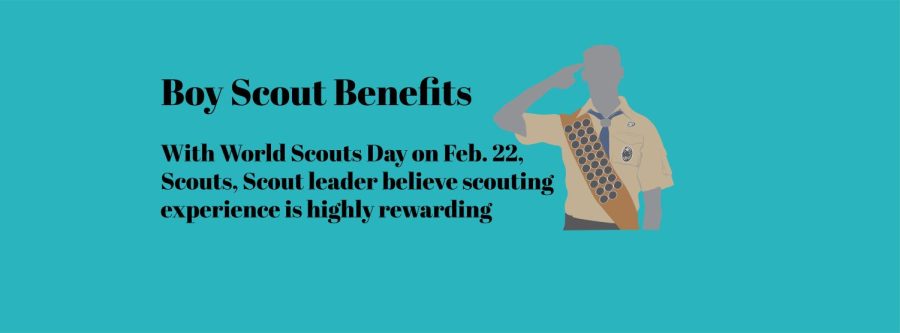Alec Zeitlin, Eagle Scout and senior, joined Cub Scouts in first grade after hearing his dad tell him stories about his time in Boy Scouts of America (BSA), and said he thinks scouting has been a life-changing experience for him and has taught him how to be a better person.
“I have completed many different service projects, (both) for people’s Eagle Scout projects (and when) someone in the community reaches out to my troop (requesting help) and we all go and help out,” he said.
BSA celebrates World Scout Day on Feb. 22 to honor Lord Robert Baden-Powel, founder of the “Boy Scouts Movement.” This celebration intends to honor the BSA virtues of leadership, service and community engagement, which BSA attempts to teach scouts through their time in the program.
Echoing Zeitlin’s statements, Bob Bissell, BSA District Committee Board Member, said BSA instills lessons into its members that can completely change the course of a scout’s life for the better.
“(Scouting) prepares kids for life with life skills that may not be taught in a classroom,” he said. “Things like citizenship, self-reliance, and sometimes reemphasize lessons learned in classrooms, sports fields or at home like perseverance, dedication, planning and working towards a (long-term) goal.”
Ryune Kono, Life Rank Scout and junior, said he thinks scouting has benefited him not only through improving his leadership skills, but also through the community scouting created and the appreciation of nature it taught him.
“(My) trip to Pictured Rocks National Lakeshore with my scout troop stands out as a good memory from scouting since it was my first backpacking trip and the view from the cliffs overlooking Lake Superior was absolutely gorgeous,” Kono said.
Similar to Kono, Zeitlin highlighted the value of the experiences he thinks only Scouting could offer him.
“The most rewarding part of being a scout is (that) I have been able to experience different activities that I would have never started or tried if it were not for scouting,” he said. “I have learned how to live and run a sailboat for a week and how to portage (and) how to start a fire from friction (that I wouldn’t have done without scouting).”
Bissell said experiences like Zietlin’s and Kono’s are not unique, and the environment Scouts creates allows for both outdoor skills and personal development.
“When you become a little older (in BSA), you start working on yourself and learning some skills and learning leadership about camping and about self-reliance,” Bissell said. “I think one of the big aspects of the program that gets missed sometimes is that they are expected to start giving those skills back, and start teaching the younger Scouts. Scouts isn’t just experiential, it’s a community of servant leadership at its core.”
Kono said he has recently been taking more leadership roles as an older scout, and served as a Senior Patrol Leader for a troop trip to not only learn more himself, but make the experience as rewarding for other scouts as it could be.
Bissell, who has been working in BSA for over 30 years, said when he sees scouts grow up and engage more with younger scouts it warms his heart.
“Looking back as an adult, and looking back on the program myself, I don’t remember all of the soccer games, tee-ball games or baseball games I played in as a kid, but I remember a great deal of my scouting activities and trips, and those are more meaningful to me.”
Both Kono and Zeitlin said they encourage anyone who can get involved with scouting to give it a try, and hope younger scouts stay engaged as they grow older.
“I think that scouting is a great program for anyone to get involved with,” Zeitlin said. “You will learn a lot and get a life-changing experience.”

































![AI in films like "The Brutalist" is convenient, but shouldn’t take priority [opinion]](https://hilite.org/wp-content/uploads/2025/02/catherine-cover-1200x471.jpg)










































![Review: “The Immortal Soul Salvage Yard:” A criminally underrated poetry collection [MUSE]](https://hilite.org/wp-content/uploads/2025/03/71cju6TvqmL._AC_UF10001000_QL80_.jpg)
![Review: "Dog Man" is Unapologetically Chaotic [MUSE]](https://hilite.org/wp-content/uploads/2025/03/dogman-1200x700.jpg)
![Review: "Ne Zha 2": The WeChat family reunion I didn’t know I needed [MUSE]](https://hilite.org/wp-content/uploads/2025/03/unnamed-4.png)
![Review in Print: Maripaz Villar brings a delightfully unique style to the world of WEBTOON [MUSE]](https://hilite.org/wp-content/uploads/2023/12/maripazcover-1200x960.jpg)
![Review: “The Sword of Kaigen” is a masterpiece [MUSE]](https://hilite.org/wp-content/uploads/2023/11/Screenshot-2023-11-26-201051.png)
![Review: Gateron Oil Kings, great linear switches, okay price [MUSE]](https://hilite.org/wp-content/uploads/2023/11/Screenshot-2023-11-26-200553.png)
![Review: “A Haunting in Venice” is a significant improvement from other Agatha Christie adaptations [MUSE]](https://hilite.org/wp-content/uploads/2023/11/e7ee2938a6d422669771bce6d8088521.jpg)
![Review: A Thanksgiving story from elementary school, still just as interesting [MUSE]](https://hilite.org/wp-content/uploads/2023/11/Screenshot-2023-11-26-195514-987x1200.png)
![Review: "When I Fly Towards You", cute, uplifting youth drama [MUSE]](https://hilite.org/wp-content/uploads/2023/09/When-I-Fly-Towards-You-Chinese-drama.png)
![Postcards from Muse: Hawaii Travel Diary [MUSE]](https://hilite.org/wp-content/uploads/2023/09/My-project-1-1200x1200.jpg)
![Review: "Ladybug & Cat Noir: The Movie," departure from original show [MUSE]](https://hilite.org/wp-content/uploads/2023/09/Ladybug__Cat_Noir_-_The_Movie_poster.jpg)
![Review in Print: "Hidden Love" is the cute, uplifting drama everyone needs [MUSE]](https://hilite.org/wp-content/uploads/2023/09/hiddenlovecover-e1693597208225-1030x1200.png)
![Review in Print: "Heartstopper" is the heartwarming queer romance we all need [MUSE]](https://hilite.org/wp-content/uploads/2023/08/museheartstoppercover-1200x654.png)




